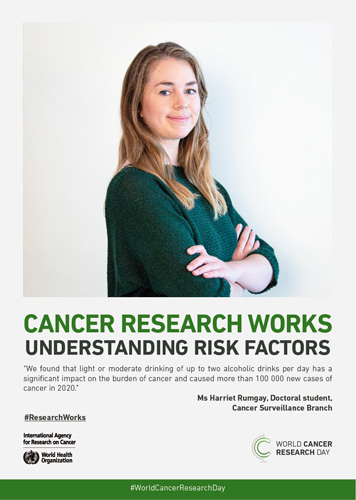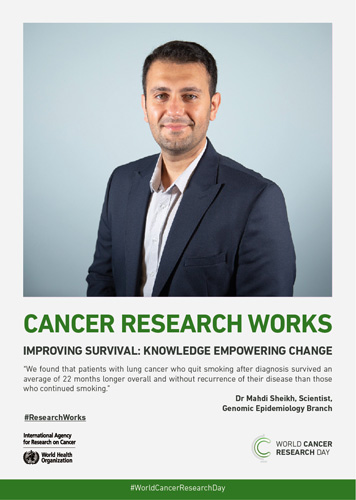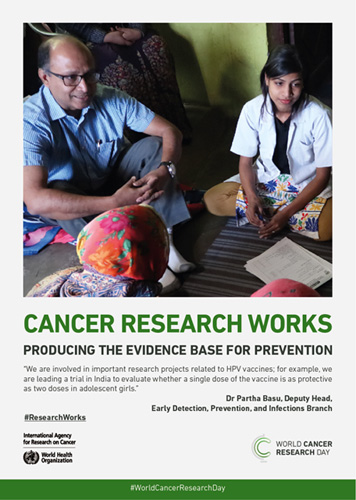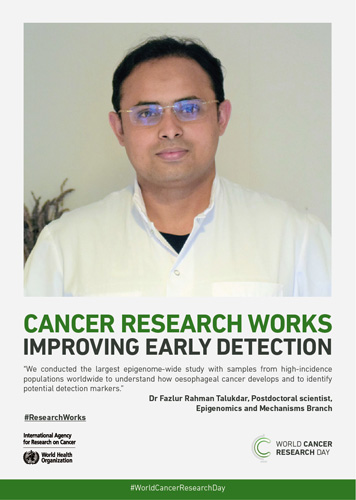
The International Agency for Research on Cancer (IARC) is marking World Cancer Research Day, which occurs on 24 September every year, by publishing a collection of visuals to highlight some of the Agency’s recent achievements in cancer research, as well as the researchers behind these achievements.
The theme of this year’s World Cancer Research Day is “Cancer Research Works: Driving Progress Together”. The collection of visuals from IARC focuses on research findings and projects that have strong potential to help reduce cancer incidence or cancer mortality.
The images below can be shared on your own social media accounts.
World Cancer Research Day is an international initiative led by the Spanish Association Against Cancer (AECC), coordinated by 10 organizations, including IARC, and supported by 105 entities and more than 600 000 people.
PostersPosters – World Cancer Research Day 2021

Understanding risk factors
Drinking alcohol can increase the risk of at least seven different cancer types. Through our research on the global impact of alcohol on cancer, we estimated that drinking alcohol caused more than 740 000 new cases of cancer in 2020 – 4% of all cancers diagnosed that year.
Men accounted for three quarters of the total burden of cancer caused by alcohol. The cancer types that contributed the most cases were cancers of the oesophagus, liver, and breast.
The impact of alcohol on cancer is often unknown or overlooked, so we need increased public awareness of the link between alcohol and cancer risk, and effective policies to decrease overall alcohol consumption. Together, these measures will help to reduce the burden of cancer caused by alcohol.
Ms Harriet Rumgay, Doctoral student, Cancer Surveillance Branch

Improving survival: knowledge empowering change
Every year, an estimated 1.8 million people die from lung cancer, and 80% of these deaths are attributable to smoking. When people who smoke are diagnosed with lung cancer, they may feel fatalistic and think there is no point in quitting smoking after they have already developed lung cancer. Unfortunately, patients with lung cancer who smoke are not routinely encouraged to quit smoking by their doctors.
Our research suggests that all patients with lung cancer who smoke should be encouraged and supported to stop smoking, regardless of their tumour stage, treatment status, or smoking intensity, because smoking cessation after diagnosis decreased the risk of death by 33% and the risk of disease progression by 30%.
Dr Mahdi Sheikh, Scientist, Genomic Epidemiology Branch

Producing the evidence base for prevention
In 2020, more than 300 000 women died of cervical cancer globally. Almost all cases of cervical cancer, as well as a high proportion of other genital cancers, anal cancers, and oropharyngeal cancers, are caused by infection with human papillomavirus (HPV).
Most cervical cancers can be prevented by vaccinating adolescent girls against HPV, but issues of cost and supply mean that the vaccine is not always available for those most at risk of cancers associated with HPV infection, particularly women in low- and middle-income countries, where cervical cancer is among the most common and most deadly cancer types.
IARC’s research related to HPV vaccines, including a trial to evaluate whether a single dose of the vaccine is as protective as two doses and a phase III trial for an HPV vaccine produced in India, could greatly reduce the cost and increase the supply of available vaccines, expanding protection against HPV-associated cancers to more of the most vulnerable groups.
Dr Partha Basu, Deputy Head, Early Detection, Prevention, and Infections Branch

Improving early detection
Oesophageal squamous cell carcinoma is one of the most aggressive and lethal forms of cancer in the world. It is often diagnosed at later stages, resulting in high mortality rates, and it has high incidence rates in low- and middle-income countries. The absence of established early detection markers contributes to late diagnosis and poor prognosis.
Our research identified and prioritized genes and pathways involved in the development of this cancer type, and proposed an early detection marker panel, which could serve as a reference for tests to improve early detection of this cancer.
Dr Fazlur Rahman Talukdar, Postdoctoral scientist, Epigenomics and Mechanisms Branch
IARC Press Release 302
Sixth edition of World Cancer Research Day: Driving progress against cancer, togetherDownload PDF




